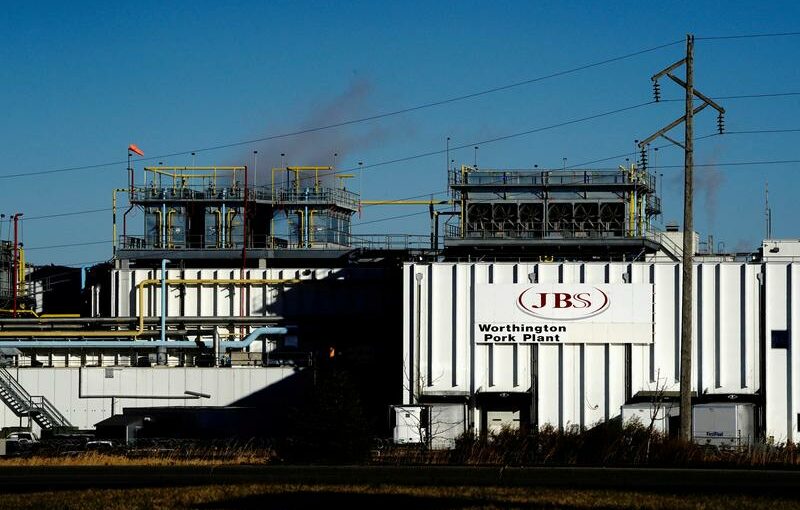CHICAGO (Reuters) -JBS canceled shifts at large U.S. and Canadian meat plants on Tuesday after the company was hit by a cyberattack over the weekend, threatening to disrupt food supply chains and further inflate food prices.
The attack caused JBS’s Australian operations to shut down on Monday. The company, the world’s largest meatpacker, said it was working to resolve the incident, which has stopped livestock slaughter in JBS plants in several U.S. states.
“On Sunday, May 30, JBS USA determined that it was the target of an organised cybersecurity attack, affecting some of the servers supporting its North American and Australian IT systems,” it said in a Monday statement.
The company has not responded for additional request for comment on the nature of the attack or why meat production is being impacted. JBS controls about 20% of the slaughtering capacity for U.S. cattle and hogs, according to industry estimates.
JBS reported the incident a few weeks after a ransomware attack on Colonial Pipeline, the largest fuel pipeline in the United States, crippled fuel delivery for several days in the U.S. Southeast.
The attack also comes at a time of rising meat prices as China increases imports, food costs rise and plants continue to face labor shortages that started during the COVID-19 pandemic.
The cyberattack could push U.S. beef prices even higher by tightening supplies, said Brad Lyle, chief financial officer for consultancy Partners for Production Agriculture.
The average unit price for U.S. fresh beef in April rose by 5% from March and was up about 10% from a year earlier, according to NielsenIQ data. Pork and chicken prices are each up about 5.4% from last year.
U.S. inventories of frozen beef at the end of April were 5% lower than a year earlier, while frozen pork supplies were down 26%, according to the U.S. Department of Agriculture.
Any impact on consumers would depend on how long production is impacted, said Matthew Wiegand, a risk management consultant and commodity broker at FuturesOne in Nebraska.
“If it lingers for multiple days, you see some food service shortages,” Wiegand said. “The good thing is that this happened after Memorial Day. You are on the downhill side of summer demand and summer bookings.”
Two kill and fabrication shifts had been canceled at JBS’s beef plant in Greeley, Colorado, due to the cyber attack, representatives of the United Food and Commercial Workers International Union Local 7 said in an e-mail. JBS Beef in Cactus, Texas, also said on Facebook it would not run on Tuesday — updating an early post that had said the plant would run as normal.
The United States Cattlemen’s Association, an industry group, said on Twitter that it had reports of JBS redirecting livestock haulers who arrived at plants and were to unload animals for slaughter.
Last year, cattle and hogs backed up on U.S. farms and some animals were euthanized when meat plants shut due to COVID-19 outbreaks among workers.
JBS Canada said in a Facebook post that shifts had been canceled at its plant in Brooks, Alberta, on Monday and one shift so far had been canceled on Tuesday.
JBS, which has its North American operations headquartered in Greeley, did not respond to additional questions about the cyberattack. A representative in Sao Paulo said the company’s Brazilian operations were not impacted.
A JBS beef plant in Grand Island, Michigan, said only workers in maintenance and shipping were scheduled to work on Tuesday due to the cyberattack.
“We continue to work through the situation and will keep you informed regarding production on Wednesday,” the Facebook post from Grand Island, Michigan, said.
The JBS cyberattack spurred a new round of support for improved cyber security.
Congressman Rick Crawford, an Arkansas Republican, called for a bipartisan effort to secure food and cyber security.
“Cyber security is synonymous with national security, and so is food security,” he wrote on Twitter.
Source: Read Full Article
